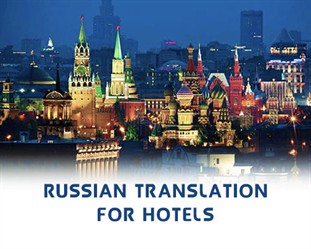Russian Translation for Hotels: Frequently Asked Questions
For new customers and especially for those who do not speak Russian, the localization process can be like walking through the forest at night. Keeping this in mind, we have developed a list of frequently asked questions with comprehensive answers which will help you gain an understanding of Russian hospitality translation basics.

1. What is Russian Glossary Development?
Russian Glossary Development is a significant step to successful localization of web content and marketing collateral for hotels. First a Localization Team is assigned to extract the glossary terms using both automatic term extraction tools and a manual review and extraction process to get a list of initial terms, which basically are frequently used text strings. Then a second step of Russian glossary development occurs whereby a linguist team edits the glossary to ensure all the terms are related to the hotel and hospitality industry, a specific client, and all trademarked and brand names are included. This glossary is then the linguistic starting point for any translations for a hotel and is made available through importation into a Translation Memory tool to all translators, editors and copywriters who will work on a hotel account.
2. How can we maintain consistency in all localized materials?
Maintaining a Translation Memory (TM) is the most fundamental tool used to achieve consistency in all translated materials. As written in our previous blog, Translation Memory can be defined as a database which stores predetermined units of a source language together with their translated equivalents. In plain language, TM is a large repository which stores all previously translated content in the source and target languages. TM works wonderfully on any projects where the target language is Russian. Being one of the richest languages with practically an unlimited number of synonyms, Russian on the one hand gives the Translation Team infinite potential for their imagination and creativity when translating, but on the other hand makes them do guess-work as the probability of finding the customer’s preferential synonym is not easy. Translation Memory technology can help to limit the number of synonyms to those that are already approved by the customer, thereby, allowing the Translation Team to proceed in the right linguistic direction.
3. What is the primary goal of Russian copywriting as it relates to translation?
Russian copywriting is a process of creating new content based on a translated source language. A primary aim of Russian copywriting is to create an attractive concept of a product or service for the customer no matter if this is a luxurious suite with a stunning view, an unforgettable waterslide in a water park or a relaxing spa treatment in a state-of-the-art venue.
4. We are not sure we require the localization of names. Can you advise?
Anyone who has ever seen a fact sheet, brochure or website from a hotel will surely notice that roughly 15 per cent of the content is names that can be divided into 2 main groups: proper names and names of restaurants, bars, rooms, suites.
Proper names: During the translation process, the localization teams’ obligation is to localize all proper names according to the grammar rules. All foreign names should be transcribed the same way as we pronounce them. For instance, if the name or surname has the English etymology, they should be transliterated according to the rules of English phonetics.
Names of restaurants, bars, rooms, suites: Before we proceed with the translation, the Localization Team together with the Project Manager and Language Lead discuss with the customer their needs and goals. Localization of names is considered to be a question of first importance. Depending on the customer’s needs, the team can suggest transliteration of certain names or leave them as they are. But when it comes to localization of any hotel or hospitality content into Russian, we follow one unspoken rule: “Leave as many names in the source language as Russian grammar allows you.” Unlocalized names like points of reference can serve successfully as Search Engine Optimization (SEO) keywords allowing the hotel’s customers to easily find a room or suite where they would like to stay, a restaurant where they would like to eat or a bar where they would like to have evening cocktails.
5. We would like to localize a tagline. Can you please advise?
The localization of taglines into Russian is a challenge especially if the customer does not have a local office in Russia or a Russian website. In this case we advise to leave the taglines in the source language as the localization will do more harm than good.
The process of tagline localization into Russian is pretty straight-forward. The Localization Team works in close collaboration with the customer and their reviewers to develop the Russian tagline which will be catchy and unique and correspond as much as possible to the original tagline in terms of meaning, nuance and style.
